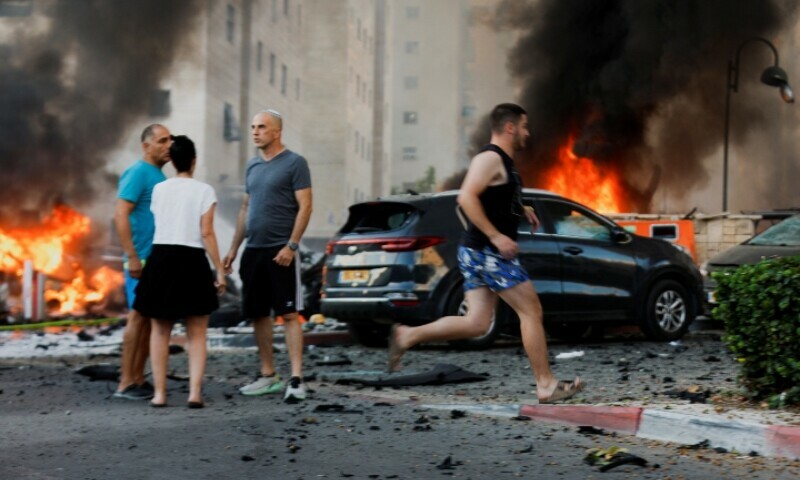
As warning sirens sounded across southern and central Israel, including in Jerusalem, Israel’s military said it was on a war footing as Prime Minister Benjamin Netanyahu called an emergency meeting of security officials.
Saturday’s incident was the most serious since Israel and Hamas fought a 10-day war in 2021, with Israeli media reporting gunbattle between bands of Palestinian fighters and security forces in towns in southern Israel.
Hamas military commander Mohammad Deif announced the start of the operation in a broadcast on Hamas media, calling on Palestinians everywhere to fight.
“This is the day of the greatest battle to end the last occupation on earth,” he said, adding that 5,000 rockets had been launched.
“We decided to put an end to all the crimes of the occupation (Israel), their time for rampaging without being held accountable is over,” Hamas said. “We announce Operation Al-Aqsa Flood and we fired, in the first strike of 20 minutes, more than 5,000 rockets. “
One Israeli woman was killed, according to emergency services, as ambulance crews were deployed in areas around the Gaza Strip.
The Israeli military said its forces were operating inside Gaza but gave no details.
“A number of terrorists have infiltrated into Israeli territory from the Gaza Strip,” the military said in a statement, adding that residents in the area surrounding the Gaza Strip had been told to stay in their homes.
Israeli media reported that gunmen had opened fire on passers-by in the town of Sderot, in southern Israel, and footage circulating on social media appeared to show clashes in city streets as well as gunmen in jeeps roaming the countryside.
Hamas media circulated video footage apparently showing a destroyed Israeli tank.
Prime Minister Benjamin Netanyahu’s office said he would meet top security officials in the coming hours and Defence Minister Yoav Gallant authorised the call-up of reservists.
In Gaza the roar of rocket launches could be heard and residents reported armed clashes along the separation fence with Israel, near the southern town of Khan Younis, and said they had seen significant movement of armed fighters.
Israel’s ambulance service said teams had been dispatched to areas in southern Israel near Gaza and residents were warned to stay inside.
A group representing military reservists who had planned to refuse to attend training over their objections to the government’s plans to overhaul the judiciary called on reservists to report for duty.
Reports of Israelis taken captive
Palestinian media also reported that a number of Israelis had been taken captive by fighters and Hamas media circulated video footage apparently showing a destroyed Israeli tank.
The Israeli military was aware of reports of captives, a security source said, but provided no further details.
A group representing military reservists who had planned to refuse to attend training over their objections to the government’s plans to overhaul the judiciary called on reservists to report for duty.
The Palestinian Islamic Jihad group said its fighters were joining Hamas in the attack.
“We are part of this battle, our fighters are side-by-side with their brothers in the Qassam Brigades until victory is achieved,” said Islamic armed wing spokesman Abu Hamza in a post on Telegram.
Palestinians in Gaza expressed disbelief at the infiltration into Israel. “It is like a dream. I still can’t believe it, fighters inside our occupied land? said one Gaza shopkeeper.
The attack came a day after Israel marked the 50th anniversary of the 1973 war that brought the country to the verge of catastrophic defeat it a surprise attack by Syria and Egypt.
Earlier border protests
Israel has imposed a crippling blockade on Gaza since 2007 after the Hamas militant group took power.
Palestinian militants and Israel have fought several devastating wars since.
The latest fire follows a period of heightened tensions in September when Israel closed the border to Gazan workers for two weeks.
The shutdown of the crossing came as Palestinian protests rocked the heavily-militarised border.
Protesters had resorted to burning tyres and throwing rocks and petrol bombs at Israeli troops, who responded with tear gas and live bullets.
Critics had slammed the border closure as collective punishment against thousands of Palestinian workers, who have far greater earning potential in Israel than Gaza, where unemployment is rife.
Resuming their passage on September 28 had raised hopes of calming the situation in Gaza, home to 2.3 million people.
In May, an exchange of Israeli air strikes and Gaza rocket fire resulted in the deaths of 34 Palestinians and one Israeli.
So far this year at least 247 Palestinians, 32 Israelis, and two foreigners have been killed in the conflict, including combatants and civilians on both sides, according to Israeli and Palestinian officials.
The vast majority of fatalities have occurred in the West Bank, which has been occupied by Israel since the 1967 Arab-Israeli conflict.
There has been a rise in army raids, Palestinian attacks targeting Israelis, and Israeli settler violence against Palestinians and their property.
Several far-right Israeli ministers live in settlements in the West Bank, which are deemed illegal under international law.






